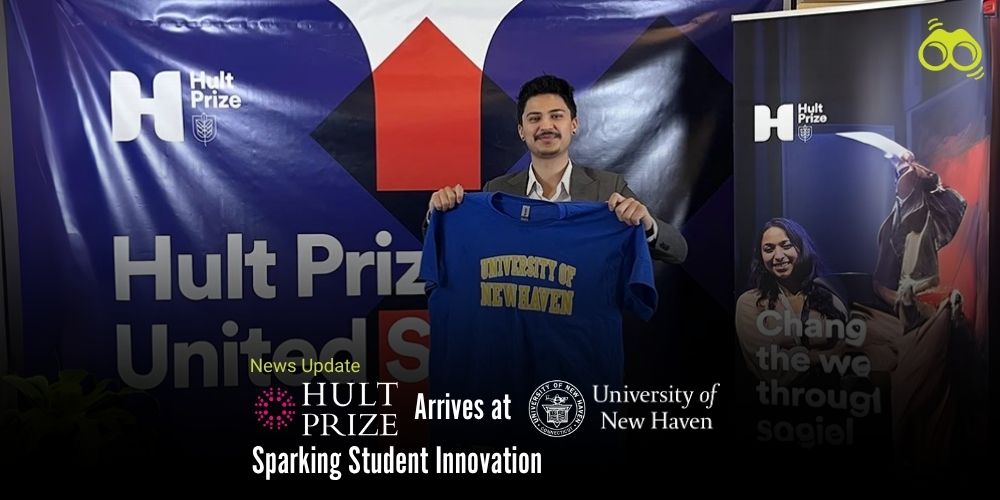Student Leadership Sets Foundation for Lasting Innovation at University of New Haven
From Vision to Impact: Student Brings Hult Prize to University of New Haven
The Hult Prize stands as a global beacon for student entrepreneurship, widely referred to as the “Nobel Prize for Students.” This prestigious annual competition challenges university students to design bold, socially-driven enterprises that tackle some of the world’s most pressing issues, from poverty and climate change to food security and public health. By merging innovation, social impact, and business acumen, the Hult Prize has become the world’s largest platform for mission-led student ventures, empowering young changemakers to turn ideas into viable solutions with global reach. For over a decade, the competition has engaged more than 100,000 students annually from over 120 countries, guiding participants from concept development to launch. Winning teams receive $1 million (USD) in seed funding to scale their ventures, affirming the competition’s commitment to long-term, scalable impact.
One such journey began with a student who first encountered the Hult Prize in 2020 during their undergraduate studies at The British College in Nepal, where they served on the organising committee. This early experience ignited a passion for innovation-led impact. Upon commencing graduate studies at the University of New Haven in 2024, they recognised a gap in opportunities that connected undergraduate and postgraduate students around social entrepreneurship. Motivated by their past involvement, they proposed the launch of the Hult Prize at the university to create an inclusive and interdisciplinary platform for real-world problem-solving.
Following a rigorous selection, interview, and onboarding process led by the Hult Foundation and university administrators, they were appointed as the institution’s first campus director. Although introducing the competition was a significant leadership milestone, the real challenge lay in building the programme from the ground up. With no pre-existing support structure, they had to navigate institutional systems, all while managing postgraduate studies and responsibilities as a student IT assistant. Their early progress was bolstered by the support of Associate Dean Dr Michael Rossi.
Once the foundation was laid, attention turned to infrastructure: recruiting participants, designing outreach campaigns, developing digital materials, managing logistics, and fostering institutional buy-in. The multitasking involved spanned visual design, email coordination, faculty engagement, and day-to-day troubleshooting. Sustaining momentum required continuous effort, made possible through contributions such as graphic design support from graduate student Rohan Poudel and hands-on assistance to teams preparing for the On-Campus Finale, the gateway to national and global competition stages.
Senior university leaders also played an instrumental role. University President Dr Jens Frederiksen recognised the programme’s long-term promise, while Vice President for University Advancement Brian Otis offered key encouragement, lending further credibility to the initiative. The inaugural launch successfully showcased a breadth of entrepreneurial talent across disciplines. Teams proposed innovative solutions to social challenges: StockWave addressed food waste through a logistics model, SoulSprout tackled hunger and unemployment via community farming, and the winning team, Sustainawave, transformed discarded denim into eco-friendly backpacks through upcycling.
The campus director and Sustainawave subsequently represented the University of New Haven at the Hult Prize U.S. National Competition in Boston, where they engaged with more than 60 student-led startups from across the country. The experience underscored the transformative power of the Hult model, which encourages purpose-driven innovation at scale. Notably, the university's Hult programme was ranked among the Top 5 in North America and within the Top 35 globally, out of over 3,000 participating institutions.
Reflecting on their tenure, the campus director described the journey as profoundly rewarding. Though their initial aim was to introduce the competition, being nominated for the 2025 Global Community Award became an unexpected honour. Yet, the most meaningful aspect, they noted, was the opportunity to leave a lasting contribution to the university, not only by launching a programme, but by cultivating a space for values-driven leadership and entrepreneurship to thrive. Looking ahead, they expressed confidence that future student leaders will continue to build on this legacy with vision and consistency. For them, lasting impact arises not from a moment of ambition but from the perseverance to transform conviction into action. The launch of the Hult Prize at the University of New Haven has sown the seeds of a lasting culture of innovation, one that empowers students to lead with purpose and reshape the future through enterprise.
Editor’s Note:
The launch of the Hult Prize at the University of New Haven is a clear example of how individual initiative can lead to lasting impact. What began as one student’s vision to create more opportunities for innovation and collaboration between undergraduates and postgraduates quickly grew into a dynamic, campus-wide programme that brought socially conscious entrepreneurship to the forefront. Through months of planning, outreach, and teamwork, the initiative gave students the chance to tackle real-world problems, from food waste to sustainable manufacturing, and turn their ideas into tangible solutions. It also showcased the value of creating inclusive spaces where students from all academic backgrounds can come together and work toward a common purpose. What makes this journey especially powerful is the ripple effect it has created. Not only did the University of New Haven earn recognition on a national and global scale, but it also laid the foundation for future student leaders to build upon.
As per Skoobuzz, the success of the Hult Prize programme sends a strong message: students are capable of leading change when they are given the tools, encouragement, and trust to do so. With continued support from faculty, university leadership, and peers, initiatives like this can shape a culture of purpose-driven innovation that extends well beyond graduation.














0 Comments (Please Login To Continue)